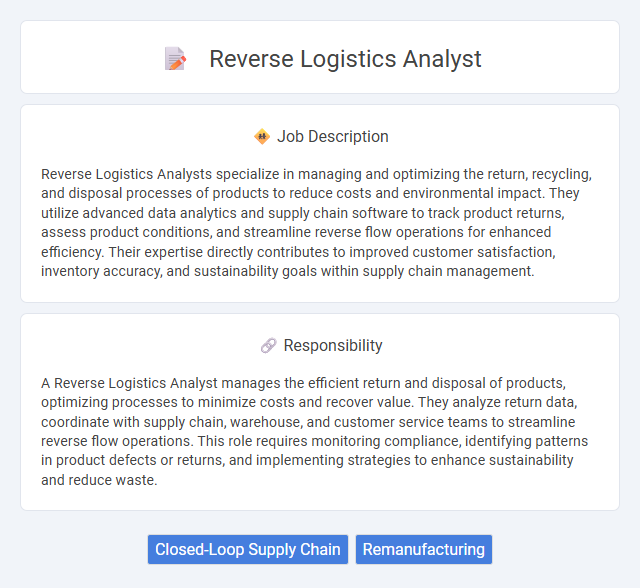
Reverse Logistics Analysts specialize in managing and optimizing the return, recycling, and disposal processes of products to reduce costs and environmental impact. They utilize advanced data analytics and supply chain software to track product returns, assess product conditions, and streamline reverse flow operations for enhanced efficiency. Their expertise directly contributes to improved customer satisfaction, inventory accuracy, and sustainability goals within supply chain management.
Individuals who are detail-oriented and possess strong analytical skills will likely thrive as Reverse Logistics Analysts, given the role's emphasis on data evaluation and process optimization. Those comfortable working in dynamic environments with a focus on sustainability and efficiency may find this position particularly suitable. People who prefer repetitive tasks without much problem-solving might not find the role as fulfilling or a good fit.
Qualification
A Reverse Logistics Analyst requires strong analytical skills and proficiency in data analysis tools such as Excel, SQL, and ERP systems to optimize return processes and minimize costs. Experience in supply chain management, inventory control, and knowledge of reverse logistics workflows are essential for effective problem-solving and process improvement. Strong communication skills and the ability to collaborate cross-functionally aid in coordinating with vendors, warehouses, and customer service teams.
Responsibility
A Reverse Logistics Analyst manages the efficient return and disposal of products, optimizing processes to minimize costs and recover value. They analyze return data, coordinate with supply chain, warehouse, and customer service teams to streamline reverse flow operations. This role requires monitoring compliance, identifying patterns in product defects or returns, and implementing strategies to enhance sustainability and reduce waste.
Benefit
A Reverse Logistics Analyst likely enhances operational efficiency by optimizing the return, repair, and recycling processes, which can significantly reduce costs for businesses. This role probably improves customer satisfaction through faster and more reliable product returns and exchanges. Companies might also benefit from better inventory management and sustainability initiatives driven by effective reverse logistics analysis.
Challenge
A Reverse Logistics Analyst likely faces the challenge of efficiently managing product returns and minimizing losses while maintaining customer satisfaction. They may need to analyze complex data patterns to identify bottlenecks and optimize the return processes. Balancing cost reduction with environmental sustainability objectives could present a persistent difficulty in this role.
Career Advancement
Reverse Logistics Analysts specialize in managing the return and refurbishment processes, optimizing supply chain efficiency, and reducing costs related to product returns and waste management. Career advancement opportunities often lead to roles such as Supply Chain Manager, Operations Manager, or Logistics Director, where strategic decision-making and leadership skills become essential. Professionals with expertise in data analysis, sustainability practices, and inventory management gain a competitive edge for promotion and higher-level roles within logistics and supply chain sectors.
Key Terms
Closed-Loop Supply Chain
A Reverse Logistics Analyst specializes in managing the Closed-Loop Supply Chain by optimizing the flow of returned products, refurbishments, and recycling processes to enhance sustainability and reduce costs. This role involves analyzing data related to product returns, refurbishments, and disposal to improve recovery rates and maximize asset value. Expertise in reverse logistics software and supply chain analytics is critical for identifying bottlenecks and implementing efficient end-of-life product strategies.
Remanufacturing
A Reverse Logistics Analyst specializing in remanufacturing evaluates return flows, optimizes the recovery processes, and ensures efficient product lifecycle extension through systematic disassembly and refurbishment. This role involves analyzing data on returned goods to identify cost-saving opportunities, reducing waste, and enhancing the profitability of remanufactured products. Expertise in supply chain optimization and sustainability metrics is critical for improving inventory management and minimizing environmental impact.
 kuljobs.com
kuljobs.com